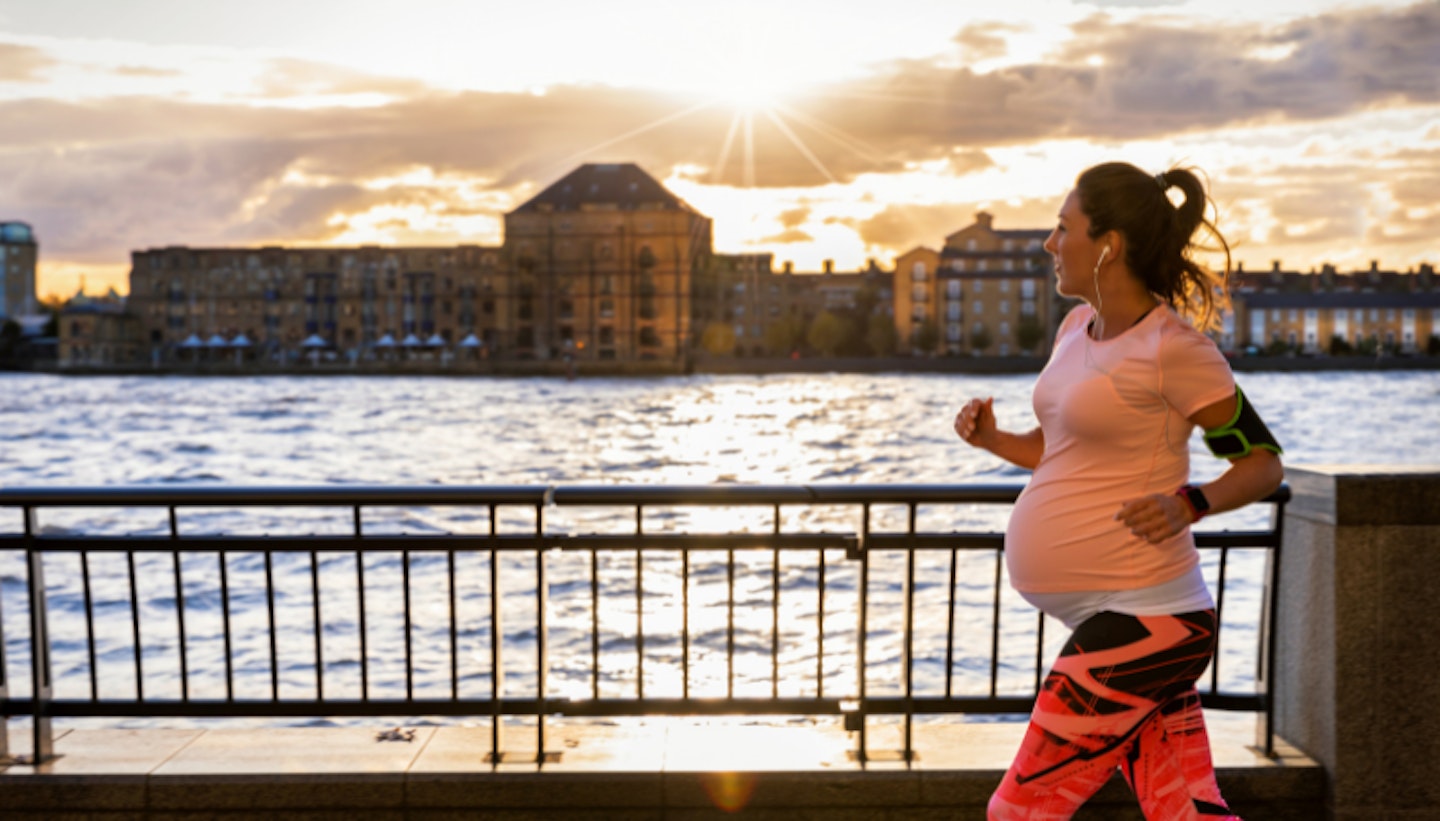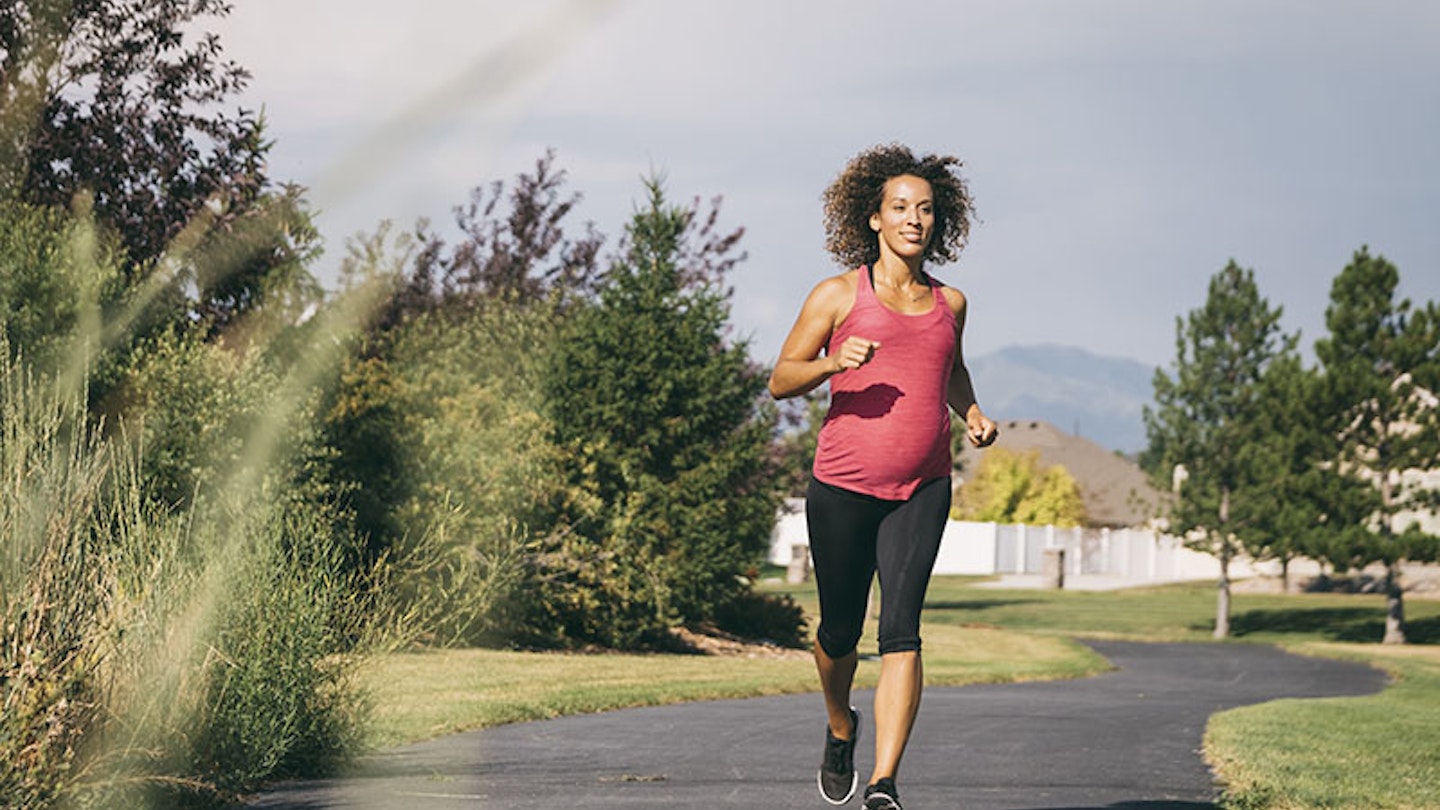Think you need to stop running just because you're pregnant? Think again! If you like nothing more than lacing up your trainers, feeling the wind in your hair and hitting the pavement, you might be able to continue running safely with some slight modifications.
If your pregnancy has been straight-forward, the NHS explains that 150 minutes of exercise each week (which is just over 20 minutes a day) has lots of benefits for mums-to-be. It will also help you adapt a lot easier to your changing weight and shape and help you have a fit and healthy pregnancy.
Sarah Campus is an experienced women's personal trainer, nutrition coach, mum of 3, and the founder of LDN MUMS FITNESS. If her clients want to continue running, she encourages them to stay hydrated and drink plenty of water before, during, and after their run to avoid dehydration. "You are not only hydrating yourself but baby as well so be sure to drink when you are not thirsty as drinking when thirsty means are you already dehydrated."
If you love that burst of endorphins that running can give, you’ll likely want to continue running during pregnancy. If you ran before you were pregnant, it’s completely fine to continue, but be aware that naturally your pace may be slower, so listen to your body and be prepared to adapt. Sarah says, "You should able to maintain a conversation whilst you run - this is known as the talk test. It’s important to adjust the intensity and focus on maintaining fitness, as opposed to pushing for speed or distance."
If you weren’t active before pregnancy, we don't recommend that you take up running, instead start simple with a gentle daily activity, like walking for 10 minutes and increase this gradually.
Running and your changing body while pregnant
Even when not pregnant, running can put a lot of pressure on the body’s joints. During pregnancy your joints start to loosen due to the hormone relaxin, so there’s a higher risk of injury. As your body begins to change and your bump grows, your balance may begin to change, so Sarah suggests "running on flat, safe surfaces - opting for flat, even terrain to reduce the risk of trips or falls." If you feel uneasy about running outdoors while pregnant, give the treadmill at your local gym a go instead.
When you hit your third trimester your pace will likely slow down as your bump gets bigger, so don’t push or be too hard on yourself. Remember, your body is growing another human being.
Don’t worry about whether the running motion will harm your baby, as it won’t. In fact a study by BMJ Sport and Exercise Medicine of 1,293 women, found no evidence of negative effects of running while pregnant. So rest assured, they are safe and secure in your womb. If however you do experience any discomfort or unusual pains while running, stop immediately and contact your midwife or doctor.
When should pregnant women avoid running?
Sarah warns that women with complicated pregnancies or pre-existing heart and lung conditions are not recommended to do any intense exercise. The following shouldn’t exercise when pregnant or at least consult their health care professional:
• Those with high-risk pregnancies (e.g., pre-eclampsia, placenta praevia after 26 weeks).
• Those who experience severe fatigue, pain, or dizziness.
• Those with a history of preterm labour or miscarriage.
• Those who not active before pregnancy without medical clearance.
• Those specifically advised against by their healthcare provider.
Tips for running safely while pregnant

1. Wear a good pair of running shoes
You may find you're a bit more wobbly on your feet, so it's essential that you have the right running shoes that support your ankles and take the pressure off of your knees. Running with that extra weight of your growing bump will add pressure to your muscles and knees. Look for a pair with good arch support and watch where you’re going when you’re running. You can also buy arch supports to insert into your current pair of trainers, if your aching feet need a bit of extra TLC.
2. Invest in a supportive running bra
As your breasts are changing rapidly during your pregnancy you’ll want them to be properly supported, especially during the second trimester so finding a supportive running bra will be a lifesaver. Invest in a sturdy one that fits perfectly, to help relieve some of the pain that may arise when running.
3. Prep and recover
Sarah says "It's important to warm up and cool down properly for you and baby. You want to prepare your body for exercise and then also ensure that you are bring yore body back to its pre exercise state."
4. Drink plenty of water
Mild dehydration during pregnancy can increase constipation (already a problem for most pregnant women) and cause false contractions, known as Braxton Hicks. If you're exercising during your pregnancy, you'll definitely need a bottle to hand. Monitor the colour of your urine to make sure you’re drinking enough fluids. It should be the colour of very light lemonade – any darker and you are already on your way to dehydration.
5. Don’t exhaust yourself
Don’t beat yourself up about not breaking your personal best, remember you are pregnant so naturally you’re going to be slower. Always listen to your body and refer back to the talk test Sarah mentions above.
6. Wear a belly support band
These lift and hold in the growing belly while also supporting the back, in their second trimester. Some say the bands can alleviate round ligament pain, or the aches and jabs women can feel in the lower belly and groin as the uterus expands.
7. Quality over quantity
Focus on your technique rather than your pace. Your body is changing so you know you're not going to be able to run like Sonic - so don't try to.
8. Listen to your body
Some runners will carry on running right up until their due date and we've even read about some women running marathons while pregnant. - talk about going the distance! But for most of us, we should listen to our body and once it feels uncomfortable, take that as a sign to stop. Sarah says "Pay attention to fatigue, discomfort, or pain. If it feels off, stop or modify your exercise and inform your health care professional if necessary."
9. Food is fuel
"Ensure you an eating enough - fuelling your body right so that you have energy to run/exercise. Remember you want to maintain energy, balance blood sugar levels, so opt for a wholesome meal 30 mins before you exercise and then eat within 30-40 minutes post exercise containing high carbohydrates and protein to replenish your glycogen stores - energy," recommends Sarah.
Benefits of exercising while pregnant
• It’s good for your mental health.
• Being outdoors and exercising releases endorphins (the happy hormone) relieving stress and anxiety.
• It can ease back, pelvic pain and constipation.
• Lowers blood pressure and reduces risk of pre-eclampsia.
• Improves sleep quality and energy levels.
• It can reduce the risk of pregnancy complications such as gestational diabetes.
• You're less likely to have delivery complications, or need an unplanned caesarean section.
• Some evidence shows active women experience less problems later in pregnancy and labour.
Can running while pregnant cause a miscarriage?
There’s no evidence to suggest that running during pregnancy can cause a miscarriage. The NHS states that exercise is not dangerous for your baby. However, if your pregnancy is complicated, talk to your doctor before starting exercise during pregnancy.
What other exercises can I do instead during pregnancy?
If you're not a fan of running, try walking, swimming, pelvic floor exercises or even some gentle prenatal yoga instead.
About the expert
Sarah Campus is a highly qualified women's PT, Nutrition Coach, mum of 3 and founder of LDN MUMS FITNESS. With qualifications in Exercise and Nutrition, she's a Level 2 and Level 3 qualified Personal Trainer and Gym Instructor, and regularly features on TV and in Magazines as a fitness and holistic wellness expert, offering tips and advice to keep the whole family healthy and active
Keya Modessa is our Senior Digital Writer and brings over a decade of experience from the digital realm to Mother&Baby. As a mother of two, Keya understands the joys and challenges of modern parenthood and uses her own experience, to give practical advice. Keya has worked across national publications including glossy women's mags, Food and Travel, and more recently as digital lead for Muddy Stilettos.
